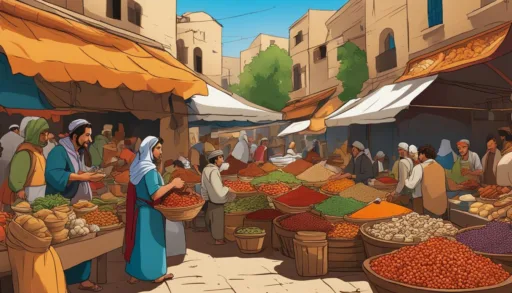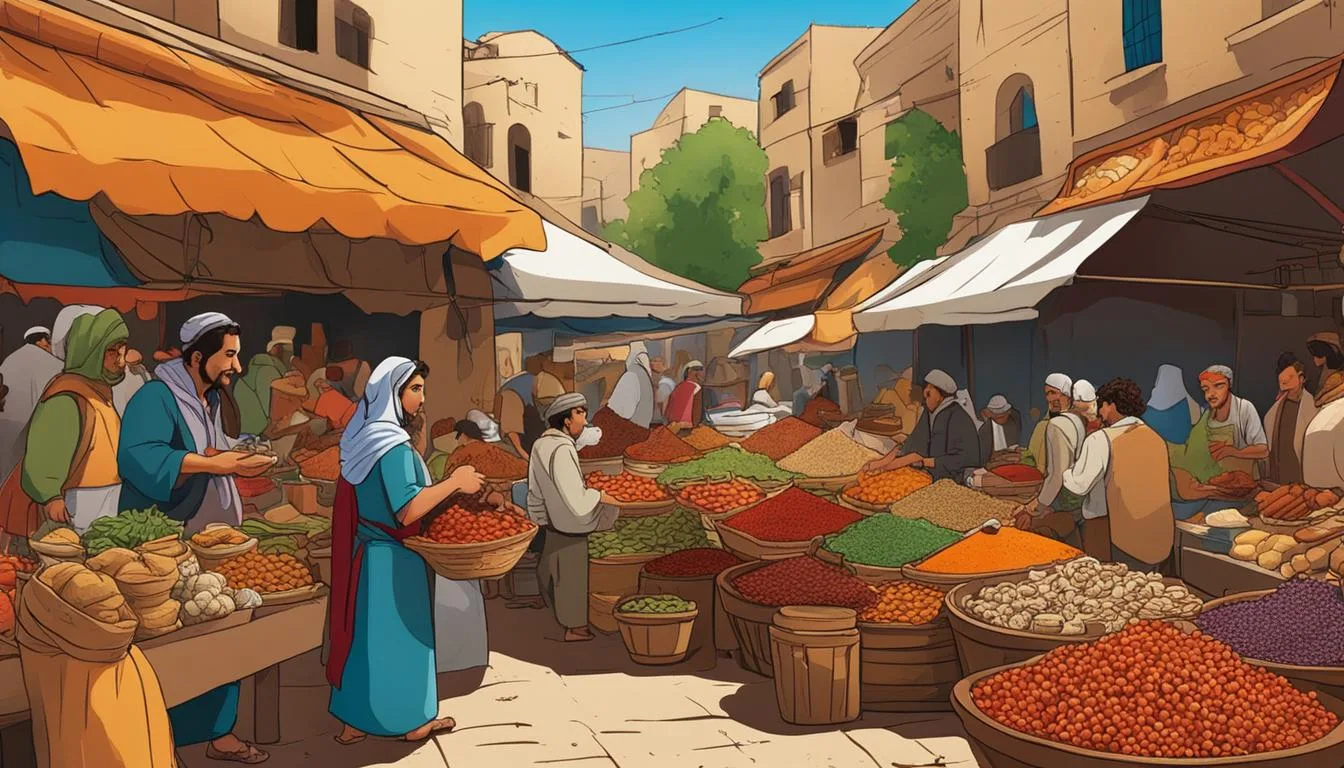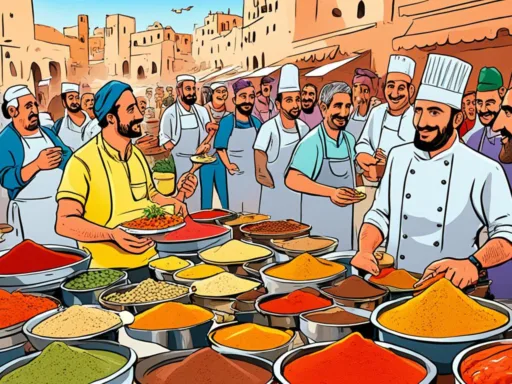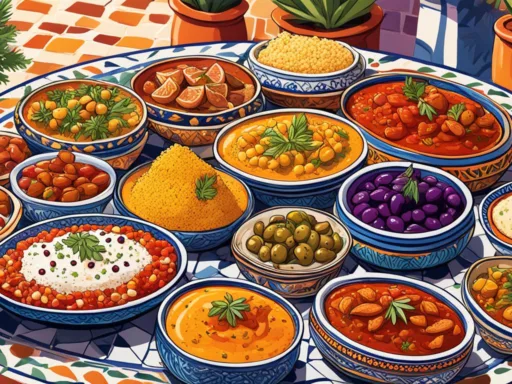Israel, a nation smaller than the state of New Jersey, boasts a culinary scene that rivals the world’s largest countries, featuring an astonishing convergence of flavors from over 70 cultures. This tiny but mighty country serves as a veritable canvas for culinary journeys that traverse the rich tapestry of Israeli cuisine. It’s a vibrant food wonderland where age-old traditional Israeli dishes are served alongside audacious new ventures, exemplifying the truly rich flavors and vibrant food culture of this unique region. In the bustling markets and along the serene Mediterranean coastline, a myriad of diverse dishes of Israel are waiting to be savored, each with a story as complex and compelling as the history of the country itself.
From the ancestral staples like falafel and hummus to the less known but equally tantalizing specialties that echo Israel’s myriad cultural influences, every bite is an adventure. Take a stroll through Tel Aviv’s bustling Carmel Market, indulge in the nightlife of Jerusalem’s Machaneh Yehudah Market, or sit down by the tranquil beaches of Tel Aviv to relish local street foods – each experience is certain to enchant your palate and leave an indelible mark on your epicurean soul. Welcome to Israel, where the convergence of past and present, tradition and innovation, creates a culinary journey unlike any other.
Key Takeaways
- Israel’s small geographic size belies its massive impact on the global culinary scene.
- The diversity of Israeli cuisine is a reflection of its rich cultural and historical mosaic.
- Traditional Israeli dishes offer a glimpse into the nation’s storied past.
- Culinary journeys through Israel reveal a commitment to rich flavors and innovation.
- Markets and street foods are at the heart of the vibrant food culture in Israel.
- Every region contributes its unique taste, adding to the diverse dishes of Israel.
The Heart of Israeli Cuisine: Mezze and Small Plates
At the core of the Israeli dining experience lies the vibrant tradition of mezze, a beautiful array of small plates that invite camaraderie and conversation. These shared dishes are a staple in Israel’s convivial food gatherings, reflecting the essence of Israeli culinary traditions. Bursting with flavors, mezze serve as both a preamble to a meal and a showcase of the local palate.
The concept of mezze extends beyond mere appetizers; it is an invitation to explore a variety of tastes and textures, making every meal a communal feast. Israeli street food has its roots in this mezze culture, offering bite-sized portions perfect for on-the-go dining. As guests meander through market lanes or gather around a family table, it’s these shared plates that set the stage for a quintessential Israeli culinary experience.
Sharing Culture Through Hummus and Falafel
The prominence of hummus in Israeli food cannot be overstated. This creamy blend of chickpeas, tahini, lemon, and garlic brings Israelis and tourists alike to the table, eager for a taste of this beloved staple. Whether scooped up with warm, fluffy pita or used as a companion to other mezze selections, hummus is a testament to the country’s rich culinary heritage.
Falafel, the veritable icon of Israeli street food, offers a flavorful spectacle in its simple yet savory form. These crispy chickpea fritters, often nestled in bread and adorned with salad and sauce, are a must-try for visitors. The beauty of falafel lies not just in its taste but also in how it represents the effortlessly inclusive nature of Israeli cuisine.
The Spice of Life: Zesty Tabbouleh and Baba Ganoush
Adding to the mezze assortment is tabbouleh, a zesty salad bursting with fresh herbs and tangy citrus notes. Its refreshing quality contrasts excellently with richer dishes and exemplifies the Mediterranean influence on Israeli food culture. These finely chopped ingredients also reflect the detailed attention Israeli chefs give to the preparation of even the simplest dishes.
Completing the mezze circuit, baba ganoush presents an irresistibly smoky eggplant dish, pureed to perfection and often drizzled with olive oil. Its texture is simultaneously rich and light, offering a canvas for various ingredients to shine through. The dish’s versatility underscores the adaptability and innovation inherent in Israeli culinary practices.
Together, these mezze plates represent more than food; they are artifacts of a society that relishes sharing, innovation, and the pure joy of flavor—a true social culinary adventure.
Israel’s Melting Pot: The Influence of Diverse Cultures on Israeli Cuisine
Israeli cuisine represents a rich tapestry woven with threads from a dynamic blend of cultures. It stands today as a testament to Israeli food culture, preserved through the centuries within each dish’s flavors and cooking techniques. From the hum of bustling city markets to quiet family kitchens, the culinary heritage of Israel is continuously celebrated and reinvented.
From the Ashkenazi to the Sephardic: A Blend of Culinary Traditions
The communal tables of Israel are graced with dishes that echo the country’s storied past. Ashkenazi classics like matzo ball soup rub shoulders with the vibrant Sephardic flavors of shakshuka and couscous, creating a menu that is inherently diverse yet harmoniously Israeli.
The Evolution of Israeli Street Food: From Ancient Markets to Modern Cities
Israeli street food, a fundamental element of the nation’s food scene, has journeyed from the ancient cobblestone alleys to the contemporary buzz of city life. The casual eateries and market stalls, where once traditional peddlers sold their wares, now see a flurry of activity where time-tested Israeli cooking techniques meet modern sensibilities.
Israeli food culture is not just about what is served on the plate, but equally about how history and modernity confluence to dish up experiences that are unique to the land. The culinary landscape of Israel stands as an open invitation – a chance to explore the cultural heritage deeply embedded in every spice, technique, and tradition.
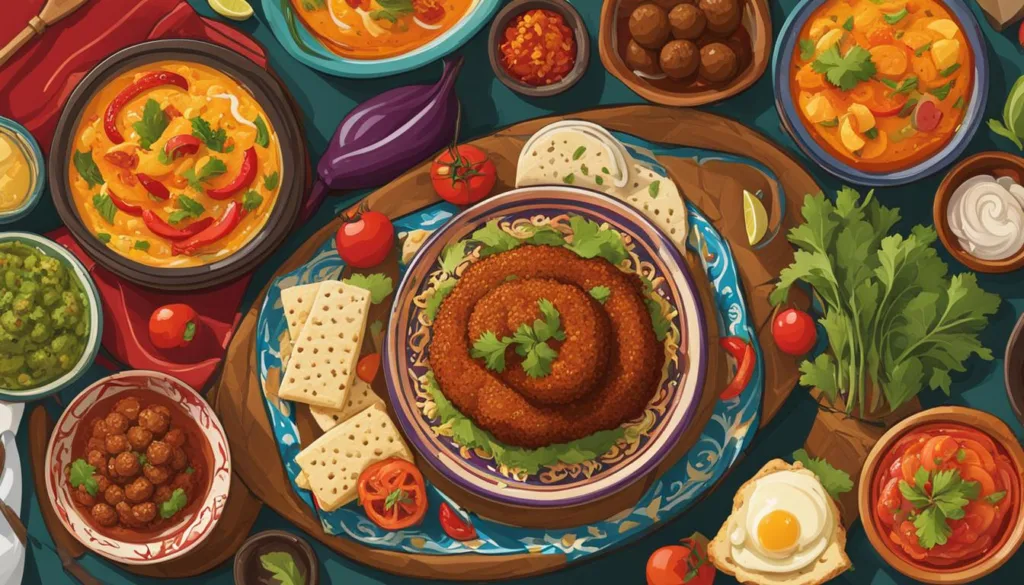
| Cultural Influence | Dishes | Cooking Techniques |
|---|---|---|
| Ashkenazi Jewish | Matzo ball soup, Gefilte fish | Slow simmering, baking |
| Sephardic Jewish | Shakshuka, Jewish-style artichokes | Stewing, grilling |
| Arab & Middle Eastern | Falafel, hummus | Frying, blending |
| Bedouin | Mansaf, Zarb | Bedouin pit cooking |
| Mediterranean | Kebabs, Greek salad | Char-grilling, fresh dressing |
This intricate web of flavors and styles defines the essence of the Israeli palette. It is where the warmth of a Moroccan tagine meets the comfort of a Polish challah, and where the street vendor’s falafel stand has become a steadfast icon of Israel’s culinary evolution. Such a celebration of diversity ensures that every meal in Israel is more than just sustenance – it’s a flavorful journey through the heart of its cultural heritage.
Iconic Flavor: Classic Israeli Street Food
Wandering through the bustling streets of cities like Tel Aviv and Jerusalem, one is immediately enveloped by the tantalizing aromas of Israeli street food. This gastronomic phenomenon boasts flavors as bold and dynamic as the country’s history, offering food enthusiasts a delectable sampling of traditional Israeli dishes. Let us dive into a few iconic staples that are the heart and soul of food in Israel.
- Falafel: Deep-fried chickpea balls, seasoned with a blend of herbs and spices, are the quintessential Israeli delight.
- Shawarma: A rotating selection of marinated meats, shaved thin, and served with an array of fresh salads and tahini.
- Sabich: A mouthwatering concoction of fried eggplant, boiled eggs, and creamy hummus layered in a fresh pita.
Each dish not only satisfies the palate but also tells the story of Israel’s diverse cultural fabric. For those looking to savor these flavors, let’s compare three popular locations where one can partake in these savory treats.
| Falafel Stand | Shawarma Shack | Sabich Spot |
|---|---|---|
| Freshly made daily, garnished with pickles and drizzled with tahini sauce | Herb-infused lamb or chicken, topped with a tangy amba sauce | Layers of textures, complemented by amba and a hint of parsley |
| Known for quick service and street-side hustle | Typically paired with a side of golden fries or fluffy rice | A favorite weekend brunch item among locals |
| Often accompanied by a spicy zhoug for an extra kick | Includes a mini salad bar for a customized experience | Sometimes enjoyed with a refreshing mint lemonade |
From the first bite of a crunchy falafel to the last morsel of shawarma wrapped in pita, the journey through Israel’s street food scene is as much an exploration of taste as it is of culture. So, whether you’re a seasoned food traveler or a curious epicurean, a foray into this vibrant culinary world is sure to satiate and enchant.
The Spectrum of Israeli Sweets and Desserts
The delectable array of Israeli sweets and desserts stands as a testament to the rich culinary tapestry that is unique to the region. These treats not only represent a culmination of flavors and techniques but also narrate the history and culture of a nation through their creation. Delve into the sweetness that punctuates the end of many an Israeli culinary journey, and explore the treats that have become beloved across the globe.
One unforgettable highlight is the traditional Middle Eastern dessert, knafeh. This delicacy transcends the typical dessert experience with its layers of shredded filo pastry, soft cheese, and a generous pouring of sweet syrup, often topped with a sprinkle of crushed pistachios. To fully appreciate this dish’s regional significance, we present a comparative analysis of how two famed Israeli establishments have mastered their own take on knafeh:
| Dessert Name | Description | Main Ingredients | Specialty |
|---|---|---|---|
| Knafeh at Hamalabiya | Rose water-infused creamy dessert | Cream, rose water, shredded filo pastry | Known for its fragrant aroma and delicate balance of sweetness |
| Knafeh at Yaffa Knafeh | Syrup-soaked knafeh garnished with pistachios | Pistachios, syrup, filo pastry, cheese | Served with smooth vanilla ice cream complementing the rich syrup |
Not to be outshone, the ubiquitous rugelach maintains a special place amongst the country’s traditional confections. This Jewish pastry bridges the old world with the new, with each twist revealing layers of pastry filled with everything from velvety marzipan to luscious chocolate. In the heart of Tel Aviv or the meandering alleys of Jerusalem, the scent of freshly baked rugelach is an invitation to indulge in a piece of history.

Inviting, aromatic, and rich in tradition, these Israeli sweets serve as a sweet conclusion to any meal and a reminder of the vibrant cultural experiences awaiting on an Israeli culinary journey. Whether you’re a longtime enthusiast or a curious newcomer to the world of Israeli desserts, there’s a flavor and a story waiting to be discovered in each bite.
Grapes of the Promised Land: Exploring Israeli Wineries
Israel’s winemaking heritage is steeped in history, embracing the land and its modern innovations. Israeli wineries, a testament to the country’s rich cultural fabric, invite oenophiles and casual drinkers alike to explore and appreciate the flavors unique to the region— a true highlight of the Israeli food culture.

Savoring the Fruits of Galilee: The Rise of Israeli Wines
Galilee’s scenic vineyards are not only a feast for the eyes but also for the palette. With a wine-producing history that encompasses the old and the new world styles, the region offers visitors a rich journey through its flourishing wine culture. The Tishbi Winery stands out particularly, balancing tradition with modernity, inviting enthusiasts to delve into their vast selection of wines. Their commitment to quality has earned them a spot among the best restaurants in Israel, where their wines are often featured.
Community and Culture at Tulip Winery of Kfar Tikvah
At the heart of Kfar Tikvah lies the Tulip Winery, a place where community spirit and the love for winemaking come together in perfect harmony. This charming winery is a reflection of Israel’s inclusive ethos, blending social responsibility with viticulture by supporting individuals with special needs. Is there any better way to celebrate Israeli food culture than through a business model that nourishes both the community and its visitors?
| Winery | Region | Special Features | Visitor Experience |
|---|---|---|---|
| Tishbi Winery | Galilee | Historically rich, family-owned, wide wine selection | Winery tours, tastings, pairing with artisanal foods |
| Tulip Winery | Kfar Tikvah | Communal engagement, support for special needs | Scenic tastings, community vibe, socially-inclusive atmosphere |
Both these wineries are indicative of Israel’s burgeoning wine scene, contributing significantly to an unfurling story that’s as much about cultivating fine wines as it is about fostering community. They are jewels in the crown of the Israeli wineries, offering remarkable experiences that go beyond the glass.
Israeli Culinary Journey: The Allure of Fresh Local Ingredients
Embarking on an Israeli culinary journey is as much about savoring the traditional Israeli dishes as it is about appreciating the source of their flavors—the fresh ingredients. Directly connecting farm to fork, Israeli cooking techniques celebrate the simplicity and purity found in the lan
Tastes of Tradition: Home Cooking and Family Recipes in Israel
The heart and soul of Israeli culinary traditions are often found simmering in the pots of home kitchens, where home cooking is about more than just preparing meals—it’s about preserving history and nurturing connections. Whether it’s a family gathering or a simple weeknight dinner, the dishes served are a homage to a rich heritage and a love for deeply rooted culinary practices.
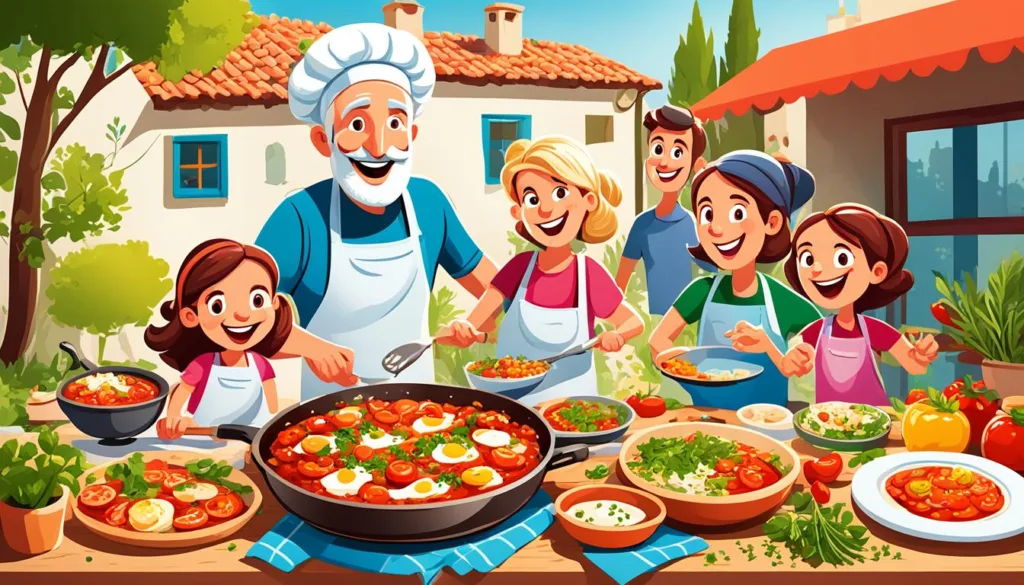
Passed down from generation to generation, family recipes in Israel are not just instructions on a page; they’re an expression of cultural identity and familial bonds. Ingredients and methods, specific to various regions and ancestries, create a tapestry of flavors unique to each family. These recipes often evolve with each passing down, adapting to the contemporary palate without losing the essence of their origins.
“Every dish tells a story, carrying the whispers of ancestors and the spirit of the land.”
Let’s take a look at a typical Israeli family’s weekly menu, showcasing how home cooking and family recipes are the heartbeats of Israeli culinary traditions:
| Day of the Week | Main Dish | Accompaniment |
|---|---|---|
| Sunday | Shakshuka | Freshly baked Challah bread |
| Monday | Herb-stuffed Fish | Couscous with Vegetables |
| Tuesday | Lentil Soup | Whole Wheat Pita |
| Wednesday | Chicken Schnitzel | Roasted Beet Salad |
| Thursday | Beef and Barley Stew | Sautéed Greens with Garlic |
| Friday | Cholent (Slow-cooked Sabbath Stew) | Pickled Cucumbers |
| Saturday | Sabich Sandwich | Israeli Salad |
Familial hospitality in Israel often means an open-door policy, where friends and neighbors join around the dining table, welcomed by the alluring aroma of dishes like a simmering pot of cholent or the tender herbs of a freshly grilled fish. This community-centric approach to home cooking weaves individuals together, creating a sense of belonging and continuity for the nation’s rich, diverse culinary lineage.
At the end of the day, the heart of Israel’s vibrant food culture pulses strongest within its homes, where traditional recipes and modern twists combine to nourish both body and soul.
Innovative Israeli Chefs: Elevating Traditional Dishes to Culinary Art
Spotlighting a culinary revolution, the creative minds of renowned Israeli chefs have undertaken the task of revolutionizing Israel’s beloved classics. With their innovative cooking techniques, these culinary artists fuse tradition with modernity, propelling Israeli fine dining into international limelight.
Revolutionizing the Classics: A New Take on Shawarma and Kebabs
Under the guidance of celebrated chefs like Uri Jeremias, shawarma and kebabs, long-standing cornerstones of Israeli street food, are undergoing a delicious transformation. The reinterpretation of these time-honored favorites challenges the status quo, as layers of flavors and inventive presentations tantalize even the most discerning palates.
Upscale Modernity: Israeli Fine Dining
Journey into the kitchens of Jerusalem’s fine dining scene, where chefs at places like Machneyuda are crafting exquisite experiences. Each plate is a masterpiece, celebrating the rich history of the land while embracing a contemporary flair. It is this bold synthesis of past and present that is setting the stage for a new era in the Israeli dining experience.
Where the Chefs Eat: Best Restaurants in Israel
Israel’s gastronomy is a vibrant collage of flavours and traditions, enticing culinary experts from every corner to partake in its rich offerings. The best restaurants in Israel serve not just as eateries but as a canvas illustrating the diverse Israeli food culture through each meticulously crafted dish. Chefs and food lovers embark on culinary journeys to these havens, seeking insight into the spices, techniques, and combinations that echo the region’s storied past and exciting future.
Dining in Israel is an experience that encapsulates the spirit of the country’s culinary evolution, from the rustic charms of authentic diners to the polished sophistication of urban gastronomy hubs. These sought-after spots, frequented by the discerning palates of renowned chefs, span the gamut of Israeli fare.
| Restaurant | Cuisine Type | Ambiance | Signature Dish |
|---|---|---|---|
| Uri Buri | Seafood | Coastal Elegance | Prawn Saganaki |
| Port Said | Fusion | Lively Urban | Slow-cooked Beef Brisket |
| HaBasta | Market Fresh | Chic and Intimate | Saffron Risotto with Seafood |
| M25 | Butchery-turned-Bistro | Industrial Chic | Smoked Short Rib |
For those who view dining as a key component of their travel itinerary, these establishments offer more than just a meal—they provide an insight into the soul of Israel’s culinary scene.
With a continuous flow of inspiration and heritage, each of these locales speaks to various aspects of the nation’s food identity. Whether it is the fusion of contemporary and classic at Port Said with its bustling, urban vibe or the masterful seafood presentations at Akko’s Uri Buri, the commitment to culinary excellence is palpable.
Enthusiasts of market-fresh cuisine find solace in the arms of HaBasta, mere steps from the famous Carmel Market, where the dishes are as seasonal as they are sensational. Conversely, the meat-centric haven that is M25 offers a unique experience where the art of butchery meets culinary finesse in an industrial-chic setting.
The burgeoning Israeli culinary scene echoes the voices of its most passionate champions, inviting us to explore each nuanced flavor and locally-sourced ingredient. Whether you’re a seasoned gastronome or a curious food explorer, the best restaurants in Israel are beacons of tradition, innovation, and sheer delight.
Culinary Education and Preservation: Role of Institutions in Israel’s Food Scene
The rich tapestry of Israel’s food culture is continuously woven with the twin threads of culinary education and preservation. Institutions across the nation play a pivotal role in not just keeping the traditions alive, but also in passing down the baton to aspiring chefs and culinary enthusiasts who embark on an authentic Israeli culinary journey. At the forefront of this endeavor stands an institution committed to both preserving the nation’s gastronomic heritage and educating its guardians.
Nurturing the Next Generation: ASIF’s Commitment to Culinary Excellence
ASIF, the Culinary Institute of Israel, has embraced the immense responsibility of cultivating future culinary experts. With a curriculum that blends traditional cooking practices with modern innovation, ASIF equips students with the knowledge and skills critical for both personal growth and the collective continuation of Israel’s diverse food culture.
Keeping Traditions Alive: The Importance of Culinary Archiving
One cannot overstate the importance of culinary preservation in maintaining the integrity of any nation’s food heritage. It’s a meticulous task that involves documenting the myriad recipes, cooking techniques, and stories that make up the soul of Israeli cuisine. Institutions dedicated to this cause ensure that the delicious history of Israel’s food is not lost to time but is instead available for future generations to learn, appreciate, and evolve.
| Institution | Focus Area | Contribution to Israeli Cuisine |
|---|---|---|
| ASIF – Culinary Institute of Israel | Culinary Education | Training chefs in traditional and contemporary Israeli culinary arts |
| Culinary Archiving Initiative | Culinary Preservation | Documenting traditional recipes and stories for preserving food heritage |
| Community Outreach Programs | Culinary Diversity | Fostering a broad appreciation of the diverse cultures within Israeli cuisine |
By endorsing these pillars of culinary sustainability — education and preservation — Israel’s gastronomic landscape continues to flourish, inviting everyone to taste its history and contribute to its dynamic future.
Conclusion
Embarking on a culinary journey through Israel is to traverse a landscape rich with flavor and steeped in history. The story of Israeli food culture is one that encapsulates the essence of a nation: vibrant, diverse, and brimming with passion. The street corners of Tel Aviv and Jerusalem buzz with an array of diverse dishes, where each bite offers insight into the lives and traditions of the people who make up this colorful country. From sizzling falafel to aromatic shakshuka, there’s a sensory treasure awaiting all who seek to explore.
The charm of Israel’s culinary scene lies not only in its present variety but also in the sacred act of preserving its past. As we’ve seen, traditional Israeli dishes carry the warmth of home kitchens and family history, offering more than just sustenance but a real connection to lineage and identity. Meanwhile, contemporary chefs in metropolitan eateries push the boundaries of gastronomy, infusing classic recipes with innovation and piquancy, leading Israeli cuisine into the future with audacity and creativity.
In essence, Israel’s gastronomy is a celebration, a symphony of flavors composed by its land, weather, and above all, its people. As the tale of Israeli cuisine continues to unfold, it remains an inviting discovery – not just of food, but also of the stories and spirits that simmer beneath the surface of each dish. For food enthusiasts and adventurers alike, Israel is more than a destination; it’s a continuous feast for the senses, a nation where every meal is an invitation to experience its heart.
FAQ
What are some must-try dishes for a traditional Israeli culinary journey?
Essential dishes include hummus, falafel, shawarma, sabich, and desserts like knafeh and rugelach. Each offers a taste of the diverse flavors integral to Israeli cuisine.
How does mezze reflect Israeli food culture?
Mezze is a dining style that offers an assortment of small dishes such as hummus, falafel, tabbouleh, and baba ganoush. It represents a sharing culture, inviting people to enjoy a variety of flavors together in a communal setting.
Can you describe the influence of different cultural traditions on Israeli cuisine?
Israeli cuisine is a melting pot of influences from Ashkenazi, Sephardic, Arab, Muslim, and Druze communities. Each adds unique flavors and dishes, contributing to the rich and diverse culinary scene in Israel.
What street foods are iconic in Israel?
Falafel, shawarma, and sabich are the cornerstones of Israeli street food. These delectable options provide a quick, flavorful meal on the go and are deeply rooted in Israeli food culture.
What makes Israeli sweets and desserts unique?
Israeli sweets like muhallebi and knafeh often incorporate local ingredients like rose water, pistachios, and regional cheese, creating a delightful range of desserts with unique flavors and textures.
What are some notable Israeli wineries for visiting?
Tishbi Winery in Galilee, known for its long history and quality wines, and Tulip Winery in Kfar Tikvah, which combines wine production with social responsibility, are highly recommended for any wine enthusiast.
Why are fresh ingredients so important in Israeli cooking?
Fresh, locally-sourced ingredients reflect the emphasis on natural flavors and seasonal eating. Markets like Machaneh Yehudah showcase the variety and quality of produce available in Israel, which is central to the cuisine.
What role does home cooking play in Israeli culinary traditions?
Home cooking is the heart of Israeli culinary traditions, where generational family recipes are preserved and shared. It’s in these kitchens that the true essence of Israeli cooking techniques and warmth can be experienced.
How are Israeli chefs innovating traditional dishes?
Chefs like Uri Jeremias are reimagining classics by incorporating modern flavors and techniques. Fine dining establishments are crafting dishes that respect tradition while pushing culinary boundaries.
What is the importance of culinary education and preservation in Israel?
Institutions like ASIF are crucial for nurturing future culinary talent and ensuring the continuation of Israeli culinary arts. Preserving recipes, techniques, and food heritage maintains the nation’s gastronomic identity for future generations.
